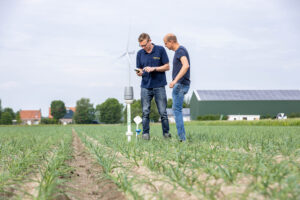CSRD Regulations: what agricultural businesses need to know
What is the CSRD and why is it important? The Corporate Sustainability Reporting Directive (CSRD) is a new European regulation that requires companies to report transparently on their environmental, social and governance (ESG) impacts. These guidelines also have an impact on the agricultural sector, where sustainability is playing an increasing role.
Starting in 2024, companies must prepare detailed reports on such things as:
- CO₂ emissions and climate targets.
- Efficient use of natural resources, such as fertilizers and water.
- Reducing negative environmental impacts, such as soil degradation and overuse of plant protection products.
What do the CSRD guidelines mean for farms?
The CSRD asks companies in the agricultural sector to put sustainability at the center of their operations. This brings challenges such as:
- Demonstrable CO₂ reduction: growers should take concrete steps to reduce their carbon footprint, for example by optimizing energy consumption and using precision agriculture technology.
- Efficient resource management: companies are encouraged to minimize wastage of resources such as fertilizers and crop protection products.
- Transparent reporting: Data on sustainable practices should be consistently and reliably captured and reported.
The emphasis is not only on regulatory compliance, but also on creating future-proof operations that remain profitable in a changing marketplace.
How can farms meet CSRD requirements?
Crop advisors play an important role in guiding farms in meeting CSRD requirements. Some practical steps:
- Map emissions: Advise companies to use tools and technologies that measure and report emissions, such as weather stations and field monitoring.
- Set measurable goals: Help companies set realistic sustainability goals, for example, a 20% reduction in carbon emissions within 5 years.
- Resource efficiency: Support growers in using precision agriculture to use resources more efficiently and avoid waste.
- Digitize processes: Encourage the use of data platforms to ensure that all information is captured centrally and conveniently. This is essential for transparency and compliance.
How does iCrop help companies comply with the CSRD?
With iCrop, farms and crop consultants have a powerful data platform to meet the requirements of the CSRD:
- Automated reporting: iCrop collects and structures data so that reports can be prepared quickly and reliably.
- Monitoring and analysis: The platform provides tools to monitor emissions, disease pressure and resource use, giving companies continuous insight into their performance
- Regulatory compliance: With iCrop, companies can easily demonstrate compliance with laws and regulations, including CSRD guidelines. The platform integrates all relevant laws and regulations directly into the system. This gives you real-time regulatory compliance support.
- Cut costs: Through efficient data management and real-time insights, companies save time and resources while meeting the most stringent requirements
Take the lead in sustainability
The CSRD offers farms not only an obligation but also an opportunity to improve their processes, cut costs and grow sustainably. As an advisor, you can make a difference by guiding clients toward future-proof operations.
Want to know how iCrop can help meet CSRD guidelines?
Contact us or schedule a demo and discover the possibilities.
Or read our other blogs on the future of agriculture or download our free white paper.
More news
Contact us
Curious about iCrop?
Request a live demo!






